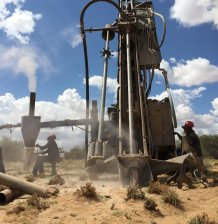
Moving from fossil fuels to renewable energy and low carbon technology means moving to an ‘age of metals’
Exeter experts lead free online course on metals in the Green Revolution
Experts from the University of Exeter are leading an innovative, free online course to explore the pivotal role that critical raw materials can play in sustainable, green technology.
World-leading researchers from the Camborne School of Mines, based at the University’s Penryn Campus, will help deliver the new course, Technology Metals for a Green Future, that begins this week.
The four-week programme, the latest in the University’s series of Massive Open Online Courses (MOOCs), is open for anyone who has an interest in learning more about sustainable mining and the role it plays in the growing ‘green’ sector.
Moving from fossil fuels to renewable energy and low carbon technology means moving to an ‘age of metals’ – and geology, mining and mineral processing have key roles to play to help secure the resources for wind turbines, solar panels, and electric vehicles.
The new course takes a look at the specialist ‘technology metals’ required to do this, covering rare earths, tantalum, niobium, tin, tungsten, lithium, platinum – specialist metals essential in low carbon technologies and also in digital technologies such as smartphones, data centres and medical equipment.
Over the duration of the course, the experts will examine definitions, terms and uses in week one; geology in week two; mining and mineral processing in week three; and responsible sourcing and circular economy in week four.
Many of the examples are from the EU Horizons 2020 HiTech AlkCarb project that has written the course (www.carbonatites.eu).
Professor Frances Wall, lead academic for the course and from the Camborne School of Mines said: “Most people rarely make the connection between hi-tech equipment like smartphones, cars or wind turbines and that fact that all of them started life as minerals in the Earth. Mining is as fundamental as farming.
“This course introduces where our technologies really come from and how geology, mining and materials researchers are working to provide our metals in the most environmentally-friendly ways.”
To enrol, or to find out more information, visit the FutureLearn course page here.
Date: 14 January 2020
